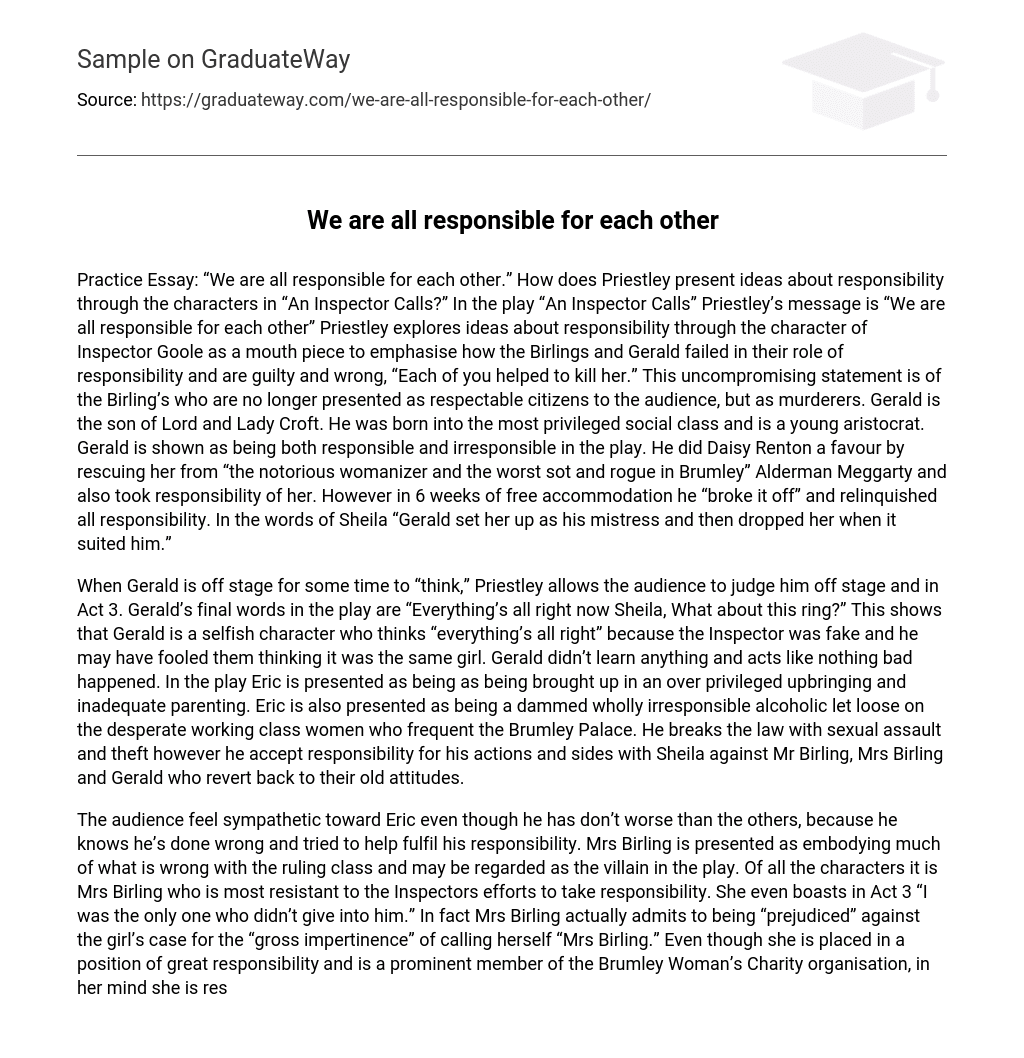Practice Essay: “We are all responsible for each other.” How does Priestley present ideas about responsibility through the characters in “An Inspector Calls?” In the play “An Inspector Calls” Priestley’s message is “We are all responsible for each other” Priestley explores ideas about responsibility through the character of Inspector Goole as a mouth piece to emphasise how the Birlings and Gerald failed in their role of responsibility and are guilty and wrong, “Each of you helped to kill her.” This uncompromising statement is of the Birling’s who are no longer presented as respectable citizens to the audience, but as murderers. Gerald is the son of Lord and Lady Croft. He was born into the most privileged social class and is a young aristocrat. Gerald is shown as being both responsible and irresponsible in the play. He did Daisy Renton a favour by rescuing her from “the notorious womanizer and the worst sot and rogue in Brumley” Alderman Meggarty and also took responsibility of her. However in 6 weeks of free accommodation he “broke it off” and relinquished all responsibility. In the words of Sheila “Gerald set her up as his mistress and then dropped her when it suited him.”
When Gerald is off stage for some time to “think,” Priestley allows the audience to judge him off stage and in Act 3. Gerald’s final words in the play are “Everything’s all right now Sheila, What about this ring?” This shows that Gerald is a selfish character who thinks “everything’s all right” because the Inspector was fake and he may have fooled them thinking it was the same girl. Gerald didn’t learn anything and acts like nothing bad happened. In the play Eric is presented as being as being brought up in an over privileged upbringing and inadequate parenting. Eric is also presented as being a dammed wholly irresponsible alcoholic let loose on the desperate working class women who frequent the Brumley Palace. He breaks the law with sexual assault and theft however he accept responsibility for his actions and sides with Sheila against Mr Birling, Mrs Birling and Gerald who revert back to their old attitudes.
The audience feel sympathetic toward Eric even though he has don’t worse than the others, because he knows he’s done wrong and tried to help fulfil his responsibility. Mrs Birling is presented as embodying much of what is wrong with the ruling class and may be regarded as the villain in the play. Of all the characters it is Mrs Birling who is most resistant to the Inspectors efforts to take responsibility. She even boasts in Act 3 “I was the only one who didn’t give into him.” In fact Mrs Birling actually admits to being “prejudiced” against the girl’s case for the “gross impertinence” of calling herself “Mrs Birling.” Even though she is placed in a position of great responsibility and is a prominent member of the Brumley Woman’s Charity organisation, in her mind she is respectably remains more important than responsibility. This makes the audience hate the character of Mrs Birling more than the others, not only is she a “cold woman” but doesn’t care of others that are low in class; she looks down upon them and see them as nothing.





